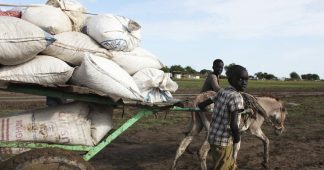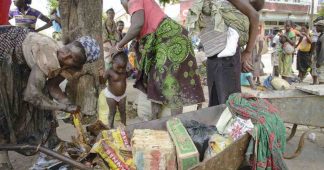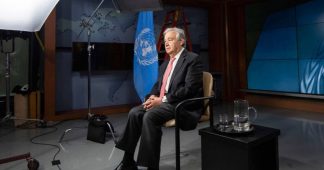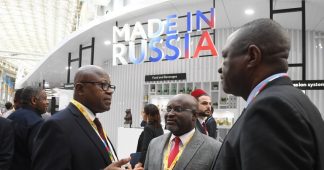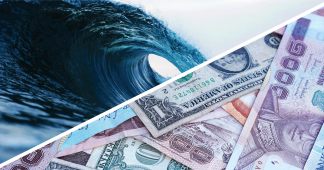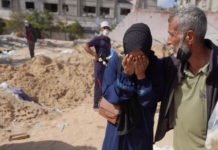Aug. 29, 2020
African debt is a painful subject for the continent, and in many ways a dark one: no one dares give exact figures, but one thing is certain: Africa’s debt is far more than it can afford. The loans of different types (with interests and without), and investments – most with “conditions”.
Let us try to calculate the approximate debt figures to understand the magnitude of the disaster. The more debt, the harder it is for Africa to achieve its own economic, and therefore political, sovereignty.
As a percentage of gross domestic product and export earnings, Africa’s debt – at least $417 billion by 2018 according to CEPS (and perhaps, even more!) on average – is the highest among the developing regions.
Various financial institutions (including international organizations such as the World Bank and IMF) and the private sector own at least 35-36% and 32% of Africa’s debt, respectively. China, one of Africa’s largest creditors, has a share of at least 20% for 2018.
According to Jubilee Debt, Africa’s foreign debt doubled in just two years (from 2015 to 2017) – from 5.9% of government revenue to 11.8%.
According to Fitch, Mozambique and the Republic of Congo have been in default since 2016, and the ratings indicate that the country faces even greater stress ahead – especially given the coronavirus effect. Zambia is rated “CC” (default is probable), while Gabon, Mozambique and the Republic of the Congo are rated “CCC” (default as a real possibility).
A further 13 countries, according to Fitch, are in the “B” range – they are experiencing a very difficult financial situation, which is largely based on speculative measures. Seven countries also have a ‘negative’ outlook in the rating – Kenya, Uganda, Cameroon, Ethiopia, Namibia, Nigeria and South Africa.
The weak credit performance of many sub-Saharan countries (in addition to high public debt) reduces their debt sustainability and resilience and makes them disproportionately vulnerable to global coronavirus shock, according to a report by Fitch Ratings.
The IMF and the company
The International Monetary Fund (IMF) projected that economic growth in the region would decline by an unprecedented 1.6 % in 2020, against a backdrop of tightening fiscal conditions, a sharp drop in major export prices and severe disruptions to economic activity associated with the pandemic.
The IMF, however, remains one of the region’s main creditors. From time to time, the IMF has curtsied towards enslaved regions and “debt forgiveness”: for example, on 14 April, the IMF approved $500 million to cancel six-month debt payments from 25 countries, 19 of which are in Africa.
But will this help the region without its own infrastructure and well-established production? No. This is more of a PR gesture by the IMF.
Here you can find information on the individual credit countries in the region according to IMF data.
As an illustration, South Africa, one of the most economically developed countries in Africa, is an IMF holder of about $4.3 billion in debt. The $1.1% interest rate is payable over five years. And yet, the debt is unrealistic to pay. This country’s approach to creditors based in Washington was not without criticism, mainly from the South African Federation of Trade Unions and the Economic Freedom Fighters. Other parties – the Congress of the People, the Democratic Alliance and the South African Communist Party – have expressed concerns about theft and have called for transparent use of funds.
South Africa is just one of many African countries that is tired of government corruption in parallel with the tranches of giant international organizations.
Other major creditors include the New Development Bank, the Africa Development Bank (figures are not specified) etc.
The Paris club
It is also something of a pleasure for the Paris club to enslave Africa.
This organization is of particular interest in terms of French politics and neocolonialism. The Paris club is an informal intergovernmental organization of developed creditor countries under the auspices of France. The association was established in 1956, when Argentina agreed to meet with its creditors in Paris. It has 22 members, including France, Germany, the United Kingdom, the United States, South Korea, Israel and Japan.
The stated objective of recent years has been to restructure the debt of developing countries.
The volume of debt can be compared to the income of these countries: for example, while Egypt has a record debt to the Paris Club of $8.46 billion, its total debt for 2019 is estimated by the IMF “only” at 85% of GDP, compared to 95% for Angola, 109% for Mozambique and even 207% for Sudan.
“The debt to the Paris Club represents only a part of the debts of African countries”, the lawyer Nicolas Jean relativizes, for whom “this breathing is essential, but the real issue remains investment”. Africa is not over-indebted, it is under-financed, he added.
Macron recently pretended that he had gone to Africa and advised the Paris club to write off the debt. However, experts explain that Macron’s statement is not so much a charity proposal as an attempt to put pressure on China to join the Paris Club, where African debts are being negotiated and where Beijing has so far only accepted the observer position for the past two years.
As Liberation notes, France’s credit policy towards Africa is a double-edged sword, because it perpetuates the scheme of the past 30 years, which does not improve the very health infrastructure on the continent.
“How can debt relief compensate for the lack of masks, respirators and even electricity in the short term?”, the Ivorian political scientist Frank Hermann Ekra asks. He sees in this announcement “anticipation of the world to come”: “We have the feeling that Macron is trying to regain control in Africa by implicitly recalling the universalist destiny of France”. In the meantime, for the mask of generosity, he appeals more to the French than to the Africans themselves, the article notes.
Read more at https://uwidata.com/13450-how-much-does-africa-owe-and-to-whom/
